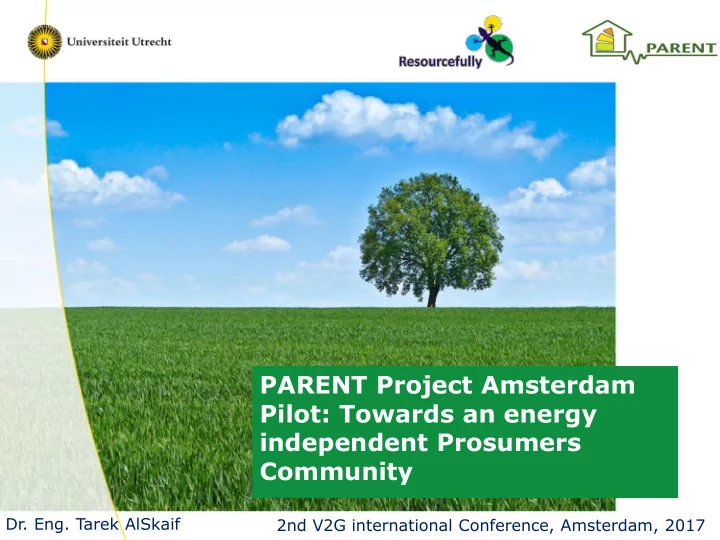

PARENT Project Amsterdam Pilot: Towards an energy independent Prosumers Community Dr. Eng. Tarek AlSkaif 2nd V2G international Conference, Amsterdam, 2017
PARENT project Aim: “ Reduce electricity consumption in households through community participation and technological solutions” Electricity meters (smart meters) • Home energy management system (HEMS) • Electricity consumption (production) data analysis • Engagement and active participation • Scope: 3 Pilots: Bergen , Brussels and Amsterdam (3 • universities, 2 consultancies and 1 hardware provider) Local authorities, electricity providers and citizens • Copernicus Insitute of Sustainable Development
1st Phase in Borneokade: 15 Prosumers Hugo Simen Caroline Niels Steve Jacco Peter Hasdrijver
SCALABILITY 1st phase Borneokade: 15 Prosumers Second phase, Amsterdam Eastern Docklands: 100 households
Pilot in Amsterdam 1st Phase - De Borneo Eiland: 15 Prosumers • Smappee system as a HEMS • HEMSs currently installed in 8 households • Data collection started in March 5, 2017 • Copernicus Insitute of Sustainable Development
1 st Phase initial results Large amount of surplus PV-generated energy injected • into the grid. Around 24 kWh on average between 25 th -30 th April for 3 • households 3 connected prosumers: 24 th April - 1 st May April 2017 Copernicus Insitute of Sustainable Development
Objectives Solutions for increasing self-consumption levels • (reduce interaction with the grid) Peak demand o Over-generation o Large-scale integration of Renewable Energy • Sources (RESs) at a neighborhood level Filling the gap between electricity suppliers and • their customers Copernicus Insitute of Sustainable Development
Proposed solutions and research activities Technical solutions: Scheduling of shiftable load (e.g., wet appliances) • Storage (in-home vs. community storage systems) • Planning of EVs charging stations • Potenial of variable electricity pricing schemes (e.g., ToU, • CPP, RTP) P2P energy (transactive energy) • Socio-economic solutions: Electricity consumption behaviour change • Engagement and active participation • Gamification (game design elements and mechanics) o Copernicus Insitute of Sustainable Development
Potential of surplus PV in Borneo Eiland for EVs charging stations Households ’ surplus PV energy to supply the demand of EV charging stations in the Borneo Eiland Copernicus Insitute of Sustainable Development
Methods System design and planning • Data analytics • Optimization techniques • Forecasting techniques • Demand and solar generation profiles o Driving patterns (plugging in/out times, driving o distance, driving styles) Electricity prices o Copernicus Insitute of Sustainable Development
Challenges Understanding the target group need • Consumption behavioral aspects o Motives: economic, environmental, etc o Comfort and privacy concerns o Different stakeholders • System operators, suppliers, end-users, etc o Data management and security • New business models • Copernicus Insitute of Sustainable Development
Dr. Eng. Tarek AlSkaif Email: t.a.alskaif@uu.nl Twitter: @Tarek_Skaif www.parent-project.eu http://www.uu.nl/staff/TAAlskaif Copernicus Insitute of Sustainable Development
Recommend
More recommend